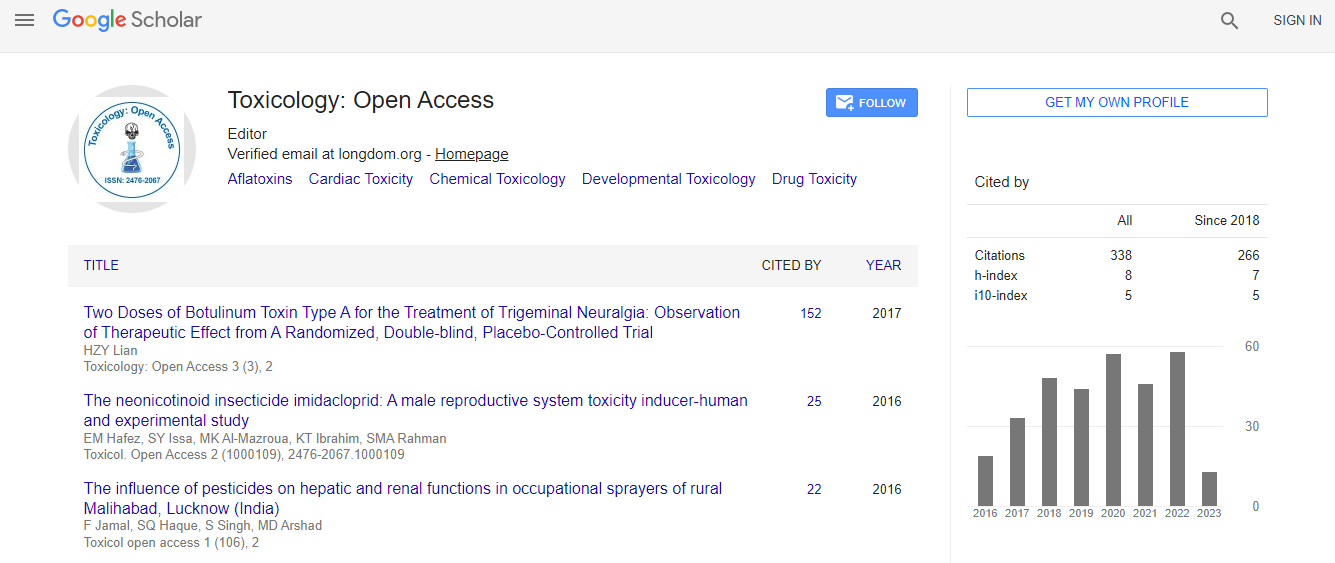Our Group organises 3000+ Global Conferenceseries Events every year across USA, Europe & Asia with support from 1000 more scientific Societies and Publishes 700+ Open Access Journals which contains over 50000 eminent personalities, reputed scientists as editorial board members.
Open Access Journals gaining more Readers and Citations
700 Journals and 15,000,000 Readers Each Journal is getting 25,000+ Readers
Google Scholar citation report
Citations : 336
Toxicology: Open Access received 336 citations as per Google Scholar report
Indexed In
- Google Scholar
- RefSeek
- Hamdard University
- EBSCO A-Z
- Geneva Foundation for Medical Education and Research
- Euro Pub
- ICMJE
Useful Links
Related Subjects
Share This Page
Profiling of lipid mediators and fatty acids in metastatic breast cancer in mice
14th World Congress on Toxicology and Pharmacology
Maria Walczak
Jagiellonian University Medical College, Poland
Keynote: Toxicol Open Access
Abstract
Statement of the Problem: Breast cancer is the most frequently diagnosed tumor in women worldwide and a leading cause of cancer death. Due to the high incidence rate of breast cancer, the development of screening method is urgently needed. Targeted lipidomic analysis has indicated the potential of using bioactive lipids and fatty acids as breast cancer biomarkers. Methodology & Theoretical Orientation: Lipid profiling in plasma was analyzed using GC/MS/MS system based on targeted lipidomic platform with the assessment of lung metastases progression in mice model (4T1) of breast cancer. To characterize lipid profile in plasma in the early and late stage of metastasis we focus on bioactive lipids and saturated, monounsaturated and polyunsaturated fatty acids pathway. Findings: Based on primary tumor growth and lung metastases, 1-2 weeks period after 4T1 cancer cells inoculation was defined as early metastatic stage, while 3-4 weeks period after 4T1 cancer cells inoculation as late metastatic stage. The early and late phase of metastasis was characterized by a different pattern of lipids profile in plasma. The main changes in plasma lipids profile were observed at the late phase of metastasis evidenced by the reduction of the ratio of polyunsaturated to saturated fatty acids. Decreased plasma concentration of free fatty acids has been found to be associated with tumor progression in mice. Conclusion & Significance: The early and late phase of metastasis in murine 4T1 metastatic breast cancer was associated with plasma lipidome remodeling and activation of lipid signaling mediators coincided with metastasis progression. Identification of lipid targets that play a role in breast cancer invasion may advance our understanding of the rapid progression of cancer and may lead to the development of new biomarkers for the disease. References 1. Chiu HH (2015) An efficient and robust fatty acid profiling method for plasma metabolomic studies by gas chromatographymass spectrometry. Clin Chim Acta; 7: 183-190. 2. Guo S (2014) Significantly increased monounsaturated lipids relative to polyunsaturated lipids in six types of cancer microenvironment are observed by mass spectrometry imaging. Sci Rep; 5(4): 5959-5970. 3. Pereira DM (2014) GC-MS lipidomic profiling of the echinoderm Marthasterias glacialis and screening for activity against human cancer and non-cancer cell lines. Comb Chem High Throughput Screen; 17: 450-457. 4. Hilvo M (2014) Monounsaturated fatty acids in serum triacylglycerols are associated with response to neoadjuvant chemotherapy in breast cancer patients. Int J Cancer; 7: 1725-33. 5. Flowers M (2010) Pilot study on the effects of dietary conjugated linoleic acid on tumorigenesis and gene expression in PyMT transgenic mice. Carcinogenesis; 9: 1642-1649.Biography
Maria Walczak has completed her Graduation from the Faculty of Pharmacy Medical Academy in Krakow, Poland and PhD degree from the Faculty of Pharmacy, Jagiellonian University Medical College (UJ CM) and Habilitation thesis in Pharmacokinetics in 2014. Since 2001 she has been working at the Department of Pharmacokinetics and Physical Pharmacy UJ CM as a Lecturer, since 2010 at the Jagiellonian Centre for Experimental Therapeutics (JCET) as a Manager of the Laboratory of Analytics and Pharmacokinetics and since 2015 as a Head of Chair and Department of Toxicology, Faculty of Pharmacy UJ CM. Her scientific work refers to pharmacokinetic and toxico-kinetic profiling, metabolite screening, targeted lipidomics and proteomics and ligands binding to blood proteins.
Email:maria.walczak@uj.edu.pl

 Spanish
Spanish  Chinese
Chinese  Russian
Russian  German
German  French
French  Japanese
Japanese  Portuguese
Portuguese  Hindi
Hindi 